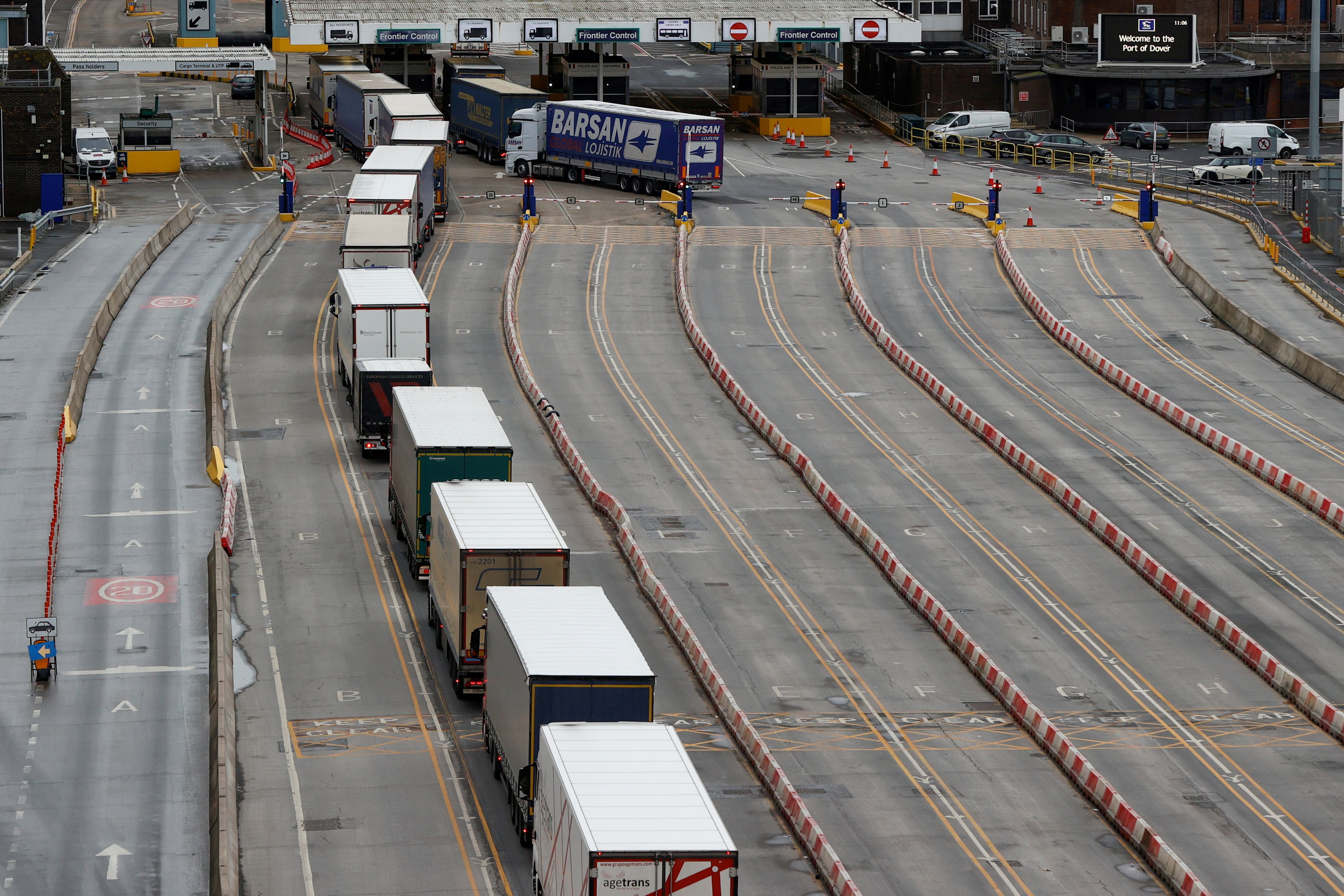UK economy shrank 2.9% in January lockdown as goods exports to EU plunges at record rate
Goods exports to the EU fell by 40.7 per cent in January

Your support helps us to tell the story
From reproductive rights to climate change to Big Tech, The Independent is on the ground when the story is developing. Whether it's investigating the financials of Elon Musk's pro-Trump PAC or producing our latest documentary, 'The A Word', which shines a light on the American women fighting for reproductive rights, we know how important it is to parse out the facts from the messaging.
At such a critical moment in US history, we need reporters on the ground. Your donation allows us to keep sending journalists to speak to both sides of the story.
The Independent is trusted by Americans across the entire political spectrum. And unlike many other quality news outlets, we choose not to lock Americans out of our reporting and analysis with paywalls. We believe quality journalism should be available to everyone, paid for by those who can afford it.
Your support makes all the difference.The UK economy shrank 2.9 per cent in January as lockdown measures took effect while exports to the EU collapsed, official figures show.
Goods exports to the EU plunged by 40.7 per cent in January and imports fell 28.8 per cent as businesses battled with new trading arrangements and a raft of red tape following the end of the Brexit transition period. The monthly falls in imports from and exports to the EU are the largest since records began in 1997.
There were no similar falls in Britain’s exports to non-EU countries, indicating that Brexit was a primary reason for the sharp decline in trade.
Separate data revealed that gross domestic product (GDP) remained 9 per cent below its pre-pandemic peak. Services - which make up the bulk of the UK economy - fell 3.5 per cent and manufacturing was down 2.3 per cent, while construction grew 0.9 per cent.
Manufacturing declined for the first time since April as car production dropped significantly, the Office for National Statistics said.
“The UK took a notable hit in January, albeit smaller than some expected, with retail, restaurants, schools and hairdressers all affected by the latest lockdown,” said Jonathan Athow, deputy national statistician for economic statistics.
Alpesh Paleja, lead economist at the Confederation of British Industry (CBI), said: “Activity fell in January, as widely expected, with much of the UK entering some form of lockdown at the start of the year.
“However, the decline was notably smaller than the first lockdown in spring 2020, demonstrating the growing ability of businesses and households to adapt to greater restrictions on mobility.”
Trade figures show exports of goods to the EU fell £5.6bn in January as businesses sought to adapt to new trading arrangements after Brexit.
Compared to the previous January, goods exports to the EU were down 38 per cent while non-EU goods exports fell 8 per cent.
Significant declines were registered across all sectors with food and live animal exports to the EU among the worst affected, falling 54 per cent. Fish & shellfish exports collapsed by 83 per cent compared to January 2020 from £92m to £16m.
Food exporters have been faced with additional paperwork and safety checks which have caused significant disruption.
Imports also fell, by £8.9bn overall (21.6 per cent), while imports from the EU dropped £6.6bn (28 per cent), the figures show.
The ONS advised caution when comparing the monthly figures because they can be erratic and changes to data collection mean some information on exports may not yet have filtered through. The fall could be exaggerated by stockpiling of goods before the 31 December end of the transition period, the ONS said.
Despite the slow start for trade in January 2021, recent survey data suggests that importing and exporting began to increase towards the end of January.
British Chambers of Commerce (BCC) head of economics Suren Thiru said: “While changes in data collection limit historic comparisons, the significant slump in UK exports of goods to the EU, particularly compared to non-EU trade, provides an ominous indication of the damage being done to post-Brexit trade with the EU by the current border disruption.”
David Frost, who negotiated the UK’s trade deal with the EU and is now Brexit minister sought to blame other factors including pre-Christmas stockpiling and “Covid lockdowns across Europe” for the dramatic slump in trade.
“These effects are starting to unwind,” he argued, adding: “Freight volumes between the UK and the EU have been back to their normal levels for over a month now, i.e. since the start of February.”
A government spokesperson said: “A unique combination of factors, including stockpiling last year, Covid lockdowns across Europe, and businesses adjusting to our new trading relationship, made it inevitable that exports to the EU would be lower this January than last.
“This data does not reflect the overall EU – UK trading relationship post Brexit and, thanks to the hard work of hauliers and traders, overall freight volumes between the UK and the EU have been back to their normal levels since the start of February.”

Join our commenting forum
Join thought-provoking conversations, follow other Independent readers and see their replies
Comments